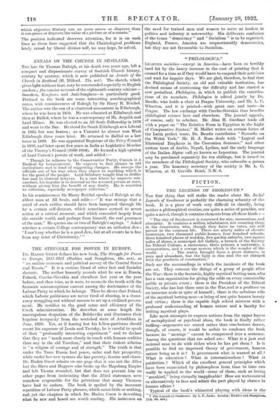ANNALS OF THE CHURCH DT SCOTLAND. Tins late Sir Thomas
Raleigh, at his death two years ago, left a compact and dispassionate survey of Soottish Church history, century by century, which is now published as Annals of the
Church in Scotland (H. Milford. 21s. net). The sketch, which gives light without heat, may be commended especially to English readers.; ,the concise account of the eighteenth-century schisms—.
Seceders, Burghers, and Anti-burghers—is particularly good.
Prefixed to the book are some interesting autobiographical notes, with reminiscences of Raleigh by Sir Harry R. Reichel.
The author was the son of a chartered accountant in Edinburgh, where he was born in 1850. He was educated at Edinburgh and then at Balliol, where he was a contemporary of Mr. Asquith and Lord Milner. He was elected to an All Souls Fellowship in 1876 and went to the Bar. He stood for South Edinburgh as a Liberal in 188d but was beaten ; as a Unionist he almost won West Edinburgh three years later. He returned to Balliol as a law- tutor in 1889. He was appointed Registrar of the Privy Council in 1896, and later spent five years in India as Legislative Member of the Viceroy's Council (1899-1904). He formed a high opinion of Lord Curzon's powers of work, and added :- "Though he adheres to the Conservative Party, Curzon is a Radical by temperament. He expects to find abuses in old institutions and is fond of suggesting changes. He sweeps the officials out of his way when they object to anything which is for the good of the people. Lord Salisbury taught him to dislike law and to distrust lawyers. In a case where he suspects mis- conduct, his impulse is to descend on the accused person at once, without giving him the benefit of any doubt. He is sensitive to criticism, especially newspaper criticism."
In his reminiscences Sir Harry Reichel speaks of Raleigh as the ablest man at All Souls, and adds :—" It was strange that a mind of such calibre should have been hampered through life by a certain self-distrust, which sometimes seemed to arrest action at a critical moment, and which concealed largely from
the outside world, and perhaps from himself, the real greatness of the man." He quotes one or two of Raleigh's sayings. " Asked whether a certain College contemporary was an orthodox Jew : ' I can't say whether he is a good Jew, but at all events he is free from any taint of Christianity.' "


































 Previous page
Previous page